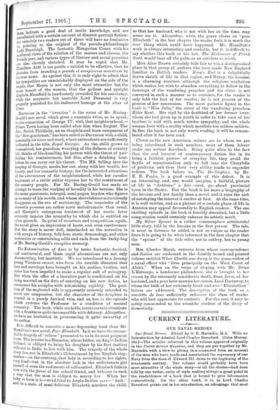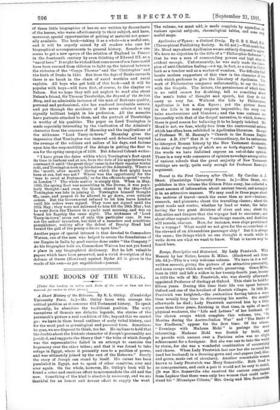C CEMENT LITERAT ETRE.
OUR NAVAL HEROES.
Our Naval Heroes. Edited by G. E. Marindin, M.A. With an Introduction by Admiral Lord Charles Beresford. (John Murray. 16s.)—The articles collected in this volume appeared originally in the United Service Magarine, and they are put together by Mr. Marindin with a view to giving in a connected form an account of the men who have made and maintained the supremacy of our Navy from the time of Edward III. down to the beginning of the nineteenth century. The volume would probably have been more attractive if the whole story—or all the stories—had been told by one writer, unity of style making always a great point in the readableness of a book that is bound to give information consecutively. On the other band, it is, as Lord Charles Beresford points out in his introduction, an advantage that most of these little biographies of heroes are written by descendants of the heroes, who warm affectionately to their subject, and have, moreover, special opportunities of getting at material not gener- ally available. The book—taking it as a whole—is a useful one, and it will be eagerly seized by all readers who care for biographical accompaniments to general history. Somehow one seems to get a new aperete of the relation of England to France in the fourteenth century by even thinking of Edward III. as a "naval hero." It might be wished that some name of sea-fame could have been rescued from oblivion to light up the interval between the victories of the • Cogge Thomas' and the ' Christopher' and the birth of Drake in 1540. But from the days of Drake onwards there is no break in the chain of naval worthies and naval exploits. All boys who get hold of this book—and it will be popular with boys—will turn first, of course, to the chapter on Nelson. But we hope they will not neglect to read also about Nelson's friend, Sir Thomas Troubridge, the Bayard of the British Navy, and an admirable instance of the man of first-rate quality, personal and professional, who has rendered invaluable service. and yet through the accidents of life never attained to any signally brilliant height in his profession. All the memoirs have portraits attached to them, and the portrait of Tronbridge is worthy of his qualities. The paper on Lord Torrington is made especially interesting by the vindication of the Admiral's character from the censures of Macaulay and the implications of the nickname "Lord Tarry-in-town." Macaulay gives the impression that Torrington was immoral and debauched beyond the average of the soldiers and sailors of his days, and fastens upon him the responsibility of the delays in getting the fleet to sea for the spring campaign of 1690. But Admiral Colomb writes :
" I have given the dates within which Torrington's fleet spent its time in harbour and at sea, from the date of his appointment to command it until the great ships' came in for their regular winter refit, and Torrington took up his duties at the Admiralty. Where is the 'month after month' during which the fleet might have been at sea, but was not ? Where was the opportunity for the tars to revel at Portsmouth,' or for the officers to spend weeks in London' ? The whole matter is simply this. When in May, 3690, the spring fleet was assembling in the Downs, it was popu- larly thought—and even the Queen shared in the idea—that Torrington was late in joining it. Torrington himself thought the same, and prayed to be allowed to go down, even without orders. But the Government refused to let him leave London until his orders were signed. They were not signed until the 26th May ; they were not delivered to him till the 29th May ; but be went down the Thames in a yacht next morning, and was on board his flagship the same night. The nickname of Lord Tarry-in-town' arose out of only this particular case. It was not the sailors' invention, but that of a nameless and scurtilons pamphleteer, writing after the defeat of Beachy Head had turned the gall of the penny-a-liners upon him."
Another paper of special interest is that devoted to Commodore Watson, one of the men who helped to secure the foundations of our Empire in India by good service done under "the Company." As his biographer tells us, Commodore Watson has not yet found a place in any biographical dictionary. But he left valuable papers which have been preserved, and a vivid description of his defence of Onore (Honilwar) against Ryder Ali is given in the words of his own—as yet unpublished—journal







































 Previous page
Previous page